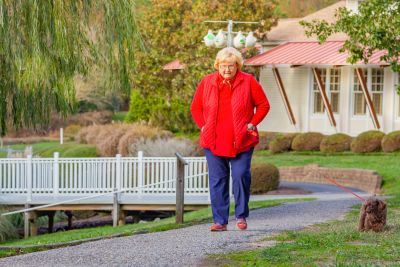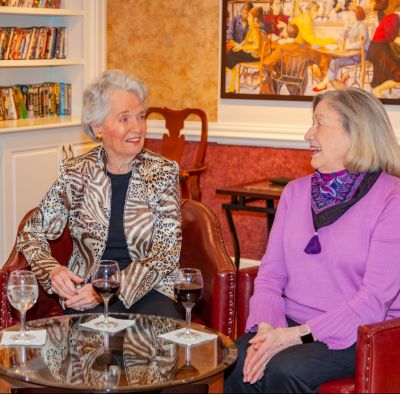 As the holidays pass into the rear view and the decidedly less festive days of mid-winter set in, many adults experience the “blues,” the “blahs,” or more serious seasonal mental health challenges. These may be signs of Seasonal Affective Disorder (SAD), a type of depression that often arises in the fall and can worsen during the winter. For everyone — but especially for seniors, who can be more vulnerable to SAD and other mental health challenges — understanding and addressing this disorder is crucial.
As the holidays pass into the rear view and the decidedly less festive days of mid-winter set in, many adults experience the “blues,” the “blahs,” or more serious seasonal mental health challenges. These may be signs of Seasonal Affective Disorder (SAD), a type of depression that often arises in the fall and can worsen during the winter. For everyone — but especially for seniors, who can be more vulnerable to SAD and other mental health challenges — understanding and addressing this disorder is crucial.
Here’s what seniors and their loved ones should know about SAD, including ways to keep balanced moods and well-being going strong during the coldest months.
What Is Seasonal Affective Disorder?
Seasonal Affective Disorder (SAD) is a type of depression that typically occurs during the fall and winter months when daylight hours are shorter. It’s characterized by its recurrent seasonal pattern, with symptoms lasting about 4 to 5 months per year. SAD symptoms may include:
- Lethargy
- Low mood, or feeling listless, hopeless, or worthless in particular
- Hypersomnia (increased urge to sleep and “hibernate”)
- Changes in appetite or weight; increased carbohydrate cravings
- Difficulty concentrating
If you experience these symptoms, you’re not alone: millions of people worldwide have SAD. However, seniors should take special care to learn about SAD and use mindful strategies to combat this seasonal challenge.
Why Seniors Are at Greater Risk
 Seniors, and senior women in particular, may be particularly susceptible to SAD due to several factors. As we age, our bodies may become more sensitive to changes in light. Additionally, seniors who live alone may face increased isolation in the winter due to mobility and transportation challenges, which can exacerbate feelings of loneliness and depression. Age-related health issues can also contribute to the risk of developing SAD, as can both gender-specific and non-gender-specific hormonal fluctuations.
Seniors, and senior women in particular, may be particularly susceptible to SAD due to several factors. As we age, our bodies may become more sensitive to changes in light. Additionally, seniors who live alone may face increased isolation in the winter due to mobility and transportation challenges, which can exacerbate feelings of loneliness and depression. Age-related health issues can also contribute to the risk of developing SAD, as can both gender-specific and non-gender-specific hormonal fluctuations.
How to Prevent Seasonal Affective Disorder During the Winter Months
Here are some strategies seniors can use to prevent SAD before it becomes a problem.
1. Maximize Your Light Exposure
- Spend time outdoors during daylight hours. Even on cloudy days, exposure to natural light can help your body produce more vitamin D and serotonin, which help with mood regulation.
- Keep curtains and blinds open during the day to let in as much light as possible.
2. Maintain a Regular Schedule
- Stick to a consistent daily routine, with regular times for waking up, eating, and going to bed.
- Include physical activity in your daily schedule. Exercise can be a powerful tool in fighting depression.
3. Stay Socially Connected
- Engage in social activities, even if it’s virtually. Regular interaction with family, friends, and acquaintances can provide significant emotional support.
- Participate in community events or join clubs and social groups that align with your interests.
4. Eat a Mood-Boosting Diet
- A diet rich in fruits, vegetables, whole grains, and lean proteins can help maintain energy levels and overall health.
- Avoid excessive caffeine, sugar, and alcohol, which can negatively affect mood and sleep patterns.
- Consider taking a vitamin D supplement to compensate for the reduced sunlight available in winter.
 Ways to Combat Seasonal Affective Disorder
Ways to Combat Seasonal Affective Disorder
If you’re experiencing symptoms of SAD, you may be able to get relief by optimizing the prevention strategies listed above. However, there are many other resources you can turn to as well.
1. Try Light Therapy
Light therapy involves sitting near a special light box for about 20 to 30 minutes a day. This treatment has been clinically proven to improve symptoms of SAD.
2. Be More Active
Engaging in regular physical activity can boost mood and energy levels. Low-impact activities like walking, swimming or water exercises, tai chi, or yoga are especially beneficial for seniors in this regard. They are gentle on the joints and can be adapted for virtually any level of physical ability, increasing the likelihood that you’ll keep doing them.
3. Use Mindfulness and Relaxation Techniques
Practices such as meditation, tai chi, yoga, and deep breathing exercises can reduce stress and improve mood.
4. Seek Help From a Healthcare Provider
If you’re experiencing symptoms of SAD, consult a healthcare professional. Early intervention can prevent symptoms from worsening. Cognitive-behavioral therapy (CBT) can be particularly effective, as it helps in changing negative thought patterns and behaviors that may be contributing to feelings of depression. In some cases, antidepressant medications can be a worthwhile approach as well. It’s important to discuss all options with your healthcare provider.
SAD in seniors is a significant concern, but it’s also a treatable condition. By understanding the risks and implementing preventative measures, seniors can prevent or significantly reduce SAD symptoms. Senior living communities like continuing care retirement communities (CCRCs) are an excellent lifestyle choice for older adults in this regard (and many others): they offer a range of mental and physical wellness resources to their residents, including strategies for addressing SAD.
Enjoy Good Mental Health With Rappahannock Westminster-Canterbury
Rappahannock Westminster-Canterbury is a continuing care community (also known as a life plan community) providing the highest quality living experience for discerning senior adults. Situated on 165 beautiful acres outside the village of Irvington in Virginia’s Northern Neck, RWC residents choose to live here for the independent and worry-free lifestyle afforded in a tranquil setting as well as a wide variety of mental health resources.
At RWC, you’re only a ten-minute drive from the picturesque Chesapeake Bay or the Rappahannock River as well as many other mood-boosting nature destinations. You’ll have access to fitness centers, a vibrant community, classes and social events, and health services tailored to your needs and preferences.
Rappahannock Westminster-Canterbury Inc. is a Virginia nonprofit corporation affiliated with the Episcopal and Presbyterian churches. All religions are welcome. Read about our residence options and living our lifestyle!
